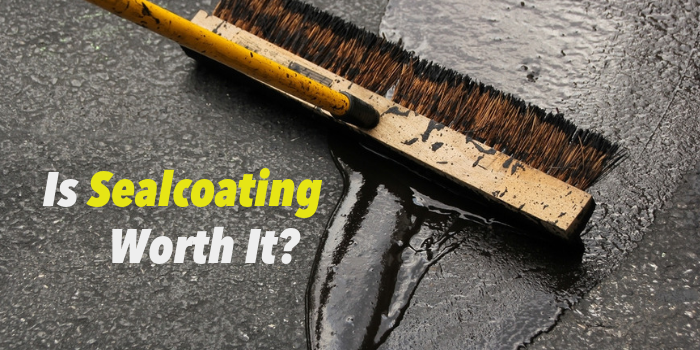Some professionals believe that sealants protect and preserve asphalt surfaces, while others feel that sealants simply create layers of buildup that eventually contribute to cracking and water damage. This begs the question of whether sealcoating is truly necessary and, if so, is it worth it?
Sealcoating can protect the asphalt from direct contact with:
- Car fluids (such as oil, gas, or antifreeze)
- Rain
- Snow
- Ice
- UV rays
- Oxygen
How Sealcoating Works
Direct exposure to the sun’s ultraviolet rays and oxygen in the air will make the asphalt brittle, which makes it more susceptible to cracks. Once the asphalt cracks, water and/or car fluids can seep in and create pools of water underneath the surface. This will lead to more cracking and further damage.
Sealcoating will protect against fading, and can even improve the appearance of your asphalt. It will restore the lustrous appearance of the asphalt, even if some natural fading has occurred. It will also fill all of minor surface flaws, giving the pavement a smooth and even appearance.
Is it Worth It?
The main drawback of sealcoating is that the process is costly and can be slightly inconvenient for drivers in your community, even though only temporarily. However, given the many benefits, adding a sealcoat is generally recommended as part of routine maintenance.
Best Practices for Sealcoating
Sealants should only be applied to roads that are in good shape. Even minor cracks should be completely filled before sealcoating. There are several different types of sealants to choose from, and each has different properties and effects.
Some types of sealants are banned in certain municipalities, so don’t forget to check for bans or restrictions before beginning your project! If you are considering adding a sealcoat to the roads within your community, be sure to seek consultation and advice from a qualified construction team. They can help you decide if roads are in good enough shape to apply a sealant and, if so, which sealant would be most appropriate for the roads under consideration.
Asphalt sealing should not be done too frequently, as this will result in excessive buildup, which will result in cracking and other unnecessary damage. Regions that experience extreme freeze/thaw cycles should consider getting a fresh sealcoat every 2-3 years.
Remember that the quality and durability of asphalt depends largely on the manner in which the asphalt was originally laid! A strong, solid base will give asphalt a long life.
Are you an HOA board member looking for assistance in managing your community? Spectrum Association Management can help! We are a refreshingly different HOA management company, dedicated to first rate customer service and the success of your community association. Contact us today to learn more about why our customers love us.







